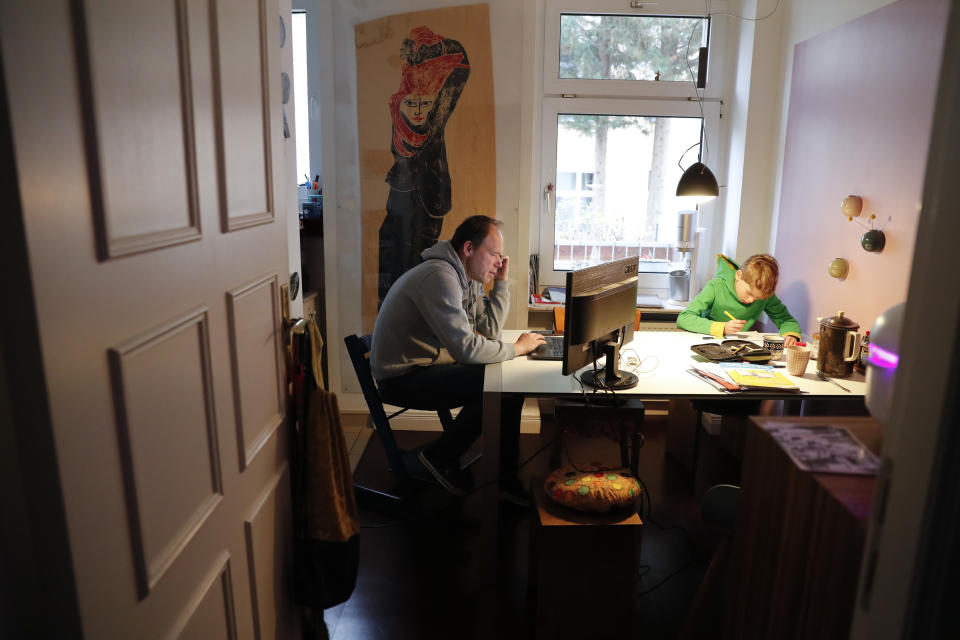Coronavirus: How to ask your boss if you can work from home to stay safe

The UK has woken up to stricter measures on Tuesday 24 March to help prevent the spread of coronavirus, including a ban on gatherings of more than two people.
As per the new rules, people should leave home only to exercise once a day, travel to and from work where “absolutely necessary,” shop for essential items and to fulfil any medical or care needs.
Instead of travelling to offices, many people are working from home for the first time to help prevent the spread of coronavirus. Although an increasing number of employers are ditching the traditional office nine-to-five in favour of flexible working, some are still hesitant to allow staff to work from home.
Staying at home, self-isolating and social distancing is crucial to keep safe and stop the spread of Covid-19. And yet many workers – even those with underlying health concerns or vulnerable family members – are still struggling to get permission to work remotely.
“Going remote doesn’t mean everything’s about to change,” says Paul Pellman, CEO of Kazoo, an employee experience platform. “At the heart of it, your work is still your work, and your relationship with your manager and colleagues is still based on trust, communication, and a shared commitment to success.
“It’s important that employees already have lines of communication and trust established before urgent situations arise like the current Covid-19 pandemic. Regular one-on-one meetings should provide an open, honest atmosphere for these conversations to take place. This frequent two-way dialogue is key to empowering employees to have conversations with their managers to get the results they desire.”
Read more: How to avoid cabin fever when working from home
First, it can help to make a plan with colleagues about how you can work from home. Depending on your work, you might want to outline what you can get done and highlight that you are able to get things done even when you are out of the office. You can suggest using certain apps or software so your manager can see what you are working on, such as Trello.
It’s important to suggest ways in which you can keep in touch remotely. If email is too slow, instant messaging platforms such as Slack can be helpful.
Pointing out that employees are likely to be more productive when working from home is also useful. If workers are worried about their health when commuting or working in an office, it is probable that they aren’t getting much done. Instead, allowing people to telecommute and stay safe is far more likely to boost trust, motivation and productivity during this challenging time.
Being at home may also be a better place to work in general, too. According to a 2017 Stanford study, remote employees had a 13% improvement in performance, in part because they were more likely to work the full workday and because it was easier to concentrate.
Most importantly, remind your boss of the current public health emergency. More than 330 people have died in the UK after testing positive for coronavirus, including young people. Thousands of people have been infected by Covid-19 and the number of cases is rising, leaving a huge number of vulnerable people at risk. If people fail to follow the new lockdown rules and leave their homes without a valid reason, they can now be fined.
Read more: Five apps to help you work from home during coronavirus pandemic
“Companies and managers who prioritise their employees understand that putting their employees’ health and emotional well-being at the forefront of their crisis response strategy is key,” Pellman says.
“Once companies do have a remote work policy in place, they need to think about the role managers play in creating a better employee experience for remote teams,” he adds. “This starts with over-communication and setting clear expectations for work-from-home employees around what work they will be doing, how their work will be completed, and how their role within the team and organisation are crucial to ensuring they are engaged in and enjoy their work.”
It’s also important for managers to regularly check-in with workers throughout the day, too. Not just to make sure expectations are being laid out clearly, but also to check how they are feeling both physically and emotionally.

 Yahoo Finance
Yahoo Finance 